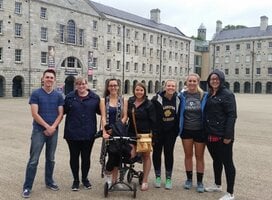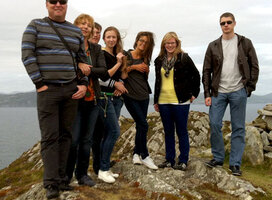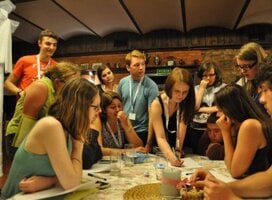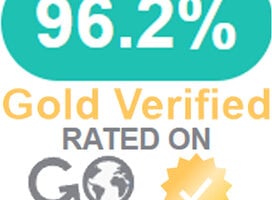Teach in Dublin, Ireland
There is no way to describe Dublin without falling into sappy-sounding clichés; the problem is many of them are true. It’s an amazing city unlike anywhere you’ve ever been before, a place where you feel at home almost instantly.
Ireland is a completely unique experience and its capital city of Dublin is even more special. Dublin has been ranked as having the highest quality of life and is now a hub for dozens of the world’s most well known companies. A country rich in history, art, music, and literature, you will never regret the decision to move to Dublin.
In order to teach English in Dublin, most teachers will require a university degree. Many language schools require native English proficiency and often TEFL or other teaching certification. The average salary for teaching in Dublin is $2,000 - $4,000 per month.
There are many different types of teaching jobs available in Dublin, you will have to do some searching and the availability will depend heavily on your qualifications. If you are not a qualified teacher, Ireland does take on expats as substitute teachers.
If you have a teaching license or a Master’s degree, you are qualified to apply for a full-time position. For those with advanced degrees, Dublin universities hire foreigners and will do the necessary paperwork to make it possible. If you have an advanced degree in science, your skills will be very desirable to universities.
A rare option is teaching English in Dublin. Another type of position is working as a volunteer teacher in Ireland. There are literacy programs in Dublin that welcome all teachers or volunteers.
When and Where to Look for Jobs:
The best time to look for teaching jobs is right before the beginning of semesters: August-September and January. Most of these contracts end in July. If you need to gain any qualifications, make sure to factor that into your time frame. If you are going through TEFL training, you must be finished before you can teach, but you can apply and interview while you’re in training.
Qualifications:
The qualifications vary based on the type of teaching position you are looking for. There are few to no requirements for volunteer or substitute teaching. Usually the requirement is a Bachelor’s degree. To teach full-time in a private or public school, the school expects teaching qualifications or certificates, as well as a Bachelor’s degree.
To work as an English teacher in Ireland, you will probably take a position at a language school. Most language schools will require that you have been through TEFL training (Teaching English as a Foreign Language), hold a Bachelor’s degree, and are a native English speaker. To teach at one of the universities, you will need advanced degrees in your field, along with letters of recommendation.
Salary & Cost of Living:
Your salary will depend entirely upon your qualifications and the type of job you get. Volunteer teaching earns nothing, while a university postdoctoral will earn €2500 per month or more. Private and language schools will almost always pay more than public schools (though public schools are unlikely to hire non-EU citizens anyway).
Some schools have arrangements in their contracts to provide basic apartments for teachers. This isn’t always the case though, so you may need to look online or visit a housing agency in Dublin to find a place. An apartment in Dublin can start around €400 per month, though you’ll see more listings at €450-600 per month. For €400 a month, it will be a studio or one-bedroom apartment. The areas of Dublin 1 and 2 will be the most expensive, while the suburbs will have cheaper housing. Don’t be afraid to look a little farther from your school because the public transit is top-notch.
Food is just a tad more expensive in Dublin since everything is shipped to the island. For example, a liter of orange juice is about €1,10 on the European continent, but €1,70 in Dublin. If you eat in for most/all of your meals, you can get away with your food bill being around €200 per month. Going out for a sandwich will cost around €4-8. Dinner out can run around €15-30, while take-away is about €8-12.
Classroom & Work Culture:
- Student/Teacher Relations: In the classroom, you’re in charge. Every age group and every school will be a little different and have different expectations, so it’s hard to give a general idea of what you ought to expect. Observe and inquire at your school to see what the norm is. The older the students though, generally the more well behaved they will be (or should be at least).
- Dress Code: At work, dress in business casual attire. There may be dress-up or dress-down occasions, but business casual is pretty standard, especially for higher education. Ask your employer about the dress code before you start. In any conversation with coworkers (or really anyone outside of close friends), stick to the classic rule: don’t discuss sex, politics, or religion in polite conversation. When you meet someone for the first time, handshakes and eye contact are always the norm. Be polite and show respect to elders and superiors.
- Greetings: The Irish people are good-humored and hospitable. Even at work, they can joke and laugh. However, they do not enjoy when foreigners joke about Irish stereotypes; it is insulting and they don’t take kindly to insults. Be proud of your accomplishments, but avoid going too close to arrogant bragging. That will annoy people very quickly in Dublin.
Things to Remember:
- The Irish drink the most tea per capita in the world. So the stereotype should really be about tea, not beer.
- No one tells a story quite like an Irishman. Just be prepared to be there a while.
- The Dublin Literary Pub Crawl is a fun experience for anyone, but especially for literature lovers. At every pub you go to, there is a different person reading passages from a famous Irish writer.
- Check the correct way before crossing the street! So many people forget that the Irish drive on the left side of the road
















